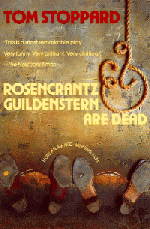
Play begins when the first player asks the second a question.
Player 2 must respond to the question with another question.
A player's response must be part of the continuing conversation, i.e., one cannot reply with a non-sequitur.
Scoring is done by foul. When a foul is called on a player, his opponent is awarded one point. A foul is called for a "statement" if the player neglects to form his reply as a question, for "hesitation" if the player takes too long in replying (or replies with a non-verbal 'grunt'), for "repetition" if the player repeats a question already asked (game not match), for "rhetoric" if the player asks a rhetorical question, and for "non-sequitur" if a player responds to his query with an unrelated question.
When a player receives a foul, a point is awarded to his opponent. First player to get three points wins a game. Matches are played to best out of three games.
The Game of Questions is featured prominently in the Tom Stoppard play, Rosencrantz & Guildenstern Are Dead and in an abridged form in the 1990 film adaptation of the same.
Ros: We could play at questions.
Guil: What good would that do?
Ros: Practice!
Guil: Statement! One - love.
Ros: Cheating!
Guil: How?
Ros: I hadn't started yet.
Guil: Statement. Two - love.
Ros: Are you counting that?
Guil: What?
Ros: Are you counting that?
Guil: Foul! No repetitions. Three - love. First game to...
Ros: I'm not going to play if you're going to be like that.
Guil: Whose serve?
Ros: Hah?
Guil: Foul! No grunts. Love - one.
Ros: Whose go?
Guil: Why?
Ros: Why not?
Guil: What for?
Ros: Foul! No synonyms! One - all.
Guil: What in God's name is going on?
Ros: Foul! No rhetoric. Two - one.
Guil: What does it all add up to?
Ros: Can't you guess?
Guil: Were you addressing me?
Ros: Is there anyone else?
Guil: Who?
Ros: How would I know?
Guil: Why do you ask?
Ros: Are you serious?
Guil: Was that rhetoric?
Ros: No.
Guil: Statement! Two - all. Game point.
Ros: What's the matter with you today?
Guil: When?
Ros: What?
Guil: Are you deaf?
Ros: Am I dead?
Guil: Yes or no?
Ros: Is there a choice?
Guil: Is there a God?
Ros: Foul! No non sequiturs, three - two, one game all.
Guil (seriously): What's your name?
Ros: What's yours?
Guil: I asked you first.
Ros: Statement. One - love.
Guil: What's your name when you're at home?
Ros: What's yours?
Guil: When I'm at home?
Ros: Is it different at home?
Guil: What home?
Ros: Haven't you got one?
Guil: Why do you ask?
Ros: What are you driving at?
Guil (with emphasis): What's your name?!
Ros: Repetition. Two - love. Match point to me.
Guil (seizing him violently): WHO DO YOU THINK YOU ARE?
Ros: Rhetoric! Game and match!
Excerpt from Rosencrantz & Guildenstern Are Dead, by Tom Stoppard.
Retrieved from "http://en.wikipedia.org/wiki/Questions_%28game%29"
See also: http://www.sff.net/people/mberry/rosen.htp




